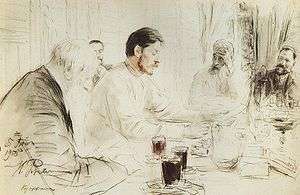Children of the Sun (play)
Children of the Sun (Russian: Дети солнца, romanized: Deti solntsa) is a 1905 play by Maxim Gorky, written while he was briefly imprisoned in Saint Petersburg's Peter and Paul Fortress during the abortive Russian Revolution of 1905.

Gorky appears to have written the play chiefly during the last eight days of his imprisonment, before his February 2, 1905 release, in response to the international protests over the imprisonment of such a prominent writer. It was nominally set during an 1862 cholera epidemic, but was universally understood to relate to contemporary events.
Production
The play was initially banned, but imperial authorities allowed it to premiere October 24, 1905 at the Moscow Art Theater. Given conditions in the city, the atmosphere was so tense that the audience began to panic in response to the mob noises in Act III. Kachalov had to stop the play to assure them that, while his character might be in danger from a mob, the audience was not.
Cast
- Vasili Kachalov as Professor Protassov
- Maria Andreyva as Lisa, his sister
- Maria Germanova as Elena, Protassov's wife
- Leonid Leonidov as Dimitri Vaguin, an artist and friend of the professor
- Vasily Luzhsky as Boris Chepurnoy
- Olga Knipper as Melanya, Chepurnoy's sister, who loves the professor
- Ivan Moskvin as Nazar Avdeyevich
- Vladimir Gribunin as Yakov Troshin
- Mikhail Gromov as Yegor, the professor's assistant
- Elena Muratova as Antonovna, the nanny
- Nina Litovtseva as Fima, the maid
- Sofya Khalyutina as Lusha, the maid
- Alexander Adashev as the doctor
Plot summary
The title refers to the privileged intellectual elite of Russia, epitomised by Protassoff, high-minded and idealistic, but basically unaware of what is going on around them in the lower depths. Lisa, in contrast, is sickly, nervous, and prophetically aware of impending crisis. It is set during an 1862 cholera epidemic in Russia in which fear drove people to mob action.
Protassov's detachment leaves him oblivious to the nearly mad Melanya's love for him; to his wife's confused love for his best friend and artist, Dmitri Vaguin; to the brutality of his assistant Yegor, and ultimately to the danger of the armed mob that comes to attack him.
References
- Adler, Jacob (1999). A Life on the Stage: A Memoir, translated and with commentary by Lulla Rosenfeld. New York: Knopf. ISBN 0-679-41351-0, 333-336 (commentary).